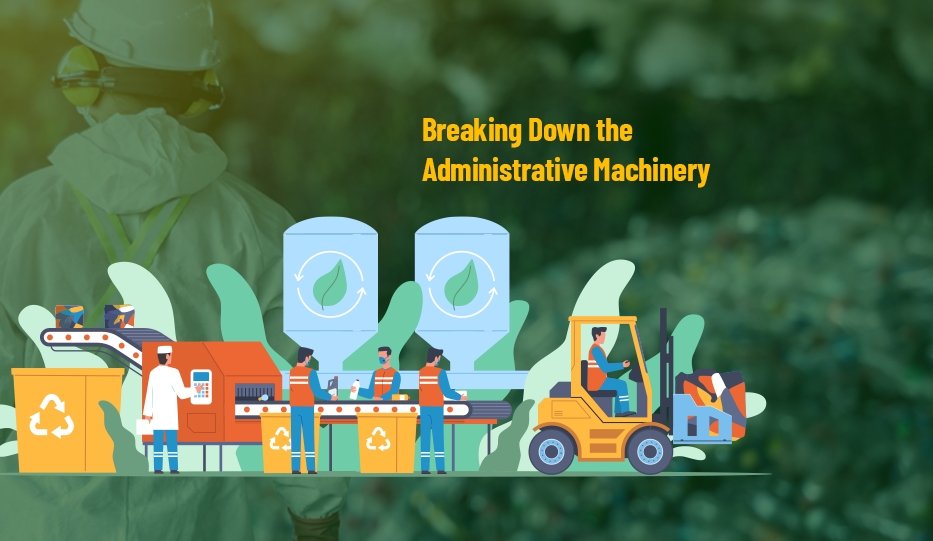Breaking Down the Administrative Machinery
In India, waste management is a complex issue that requires coordination between different levels of government and various departments. The administrative structure responsible for operating waste management systems can vary from state to state and depend on the urban or rural context.
The administrative structure of waste management in India varies across states and urban local bodies (ULBs), and rural areas. The primary responsibility for waste management lies with the ULBs in urban areas and with panchayats in rural areas.
State-wise administrative structure:
Each state in India has a separate administrative structure for waste management. The department responsible for operating waste management systems may be known as the Department of Municipal Administration, Department of Environment and Forests, or Department of Urban Development, depending on the state.
At the state level, the Department of Urban Development or the Department of Municipal Administration and Urban Development is responsible for overseeing waste management in urban areas. The Department of Rural Development is responsible for waste management in rural areas.
The following is a list of state-wise administrative structure responsible for waste management:
- Andhra Pradesh – Department of Municipal Administration and Urban Development
- Arunachal Pradesh – Department of Urban Development and Housing
- Assam – Urban Development Department
- Bihar – Urban Development and Housing Department
- Chhattisgarh – Urban Administration and Development Department
- Goa – Department of Science, Technology and Environment
- Gujarat – Urban Development and Urban Housing Department
- Haryana – Urban Local Bodies Department
- Himachal Pradesh – Department of Urban Development
- Jammu and Kashmir – Urban Development Department
- Jharkhand – Urban Development and Housing Department
- Karnataka – Department of Urban Development
- Kerala – Local Self Government Department
- Madhya Pradesh – Urban Development and Housing Department
- Maharashtra – Urban Development Department
- Manipur – Urban Development and Municipal Affairs Department
- Meghalaya – Urban Affairs Department
- Mizoram – Urban Development and Poverty Alleviation Department
- Nagaland – Urban Development Department
- Odisha – Housing and Urban Development Department
- Punjab – Department of Local Government
- Rajasthan – Local Self Government Department
- Sikkim – Urban Development and Housing Department
- Tamil Nadu – Municipal Administration and Water Supply Department
- Telangana – Municipal Administration and Urban Development Department
- Tripura – Urban Development Department
- Uttar Pradesh – Urban Development Department
- Uttarakhand – Urban Development Department
- West Bengal – Urban Development and Municipal Affairs Department
ULB administrative structure for waste management
The ULBs are responsible for waste management in urban areas. The administrative structure of ULBs varies depending on the state. Typically, each ULB has a Commissioner or Chief Officer (CO) who is responsible for the overall management of the ULB. The Solid Waste Management (SWM) department is responsible for the management of waste.
Rural administrative structure
In rural areas, the responsibility for waste management lies with the panchayats. The panchayats are responsible for waste collection, transportation, and disposal. The administrative structure of panchayats varies depending on the state. Typically, each panchayat has a Sarpanch or Gram Panchayat President who is responsible for the overall management of the panchayat. The Solid Waste Management (SWM) department is responsible for the management of waste.
In general, waste management in urban areas is the responsibility of the Urban Local Bodies (ULBs), which are the local governments that govern urban areas, such as municipalities, city corporations, or town councils. In rural areas, the Gram Panchayats or Village Councils are responsible for waste management.
In addition to the departments mentioned above, the Ministry of Environment, Forest and Climate Change (MoEFCC) is responsible for coordinating and promoting sustainable waste management practices at the national level.
